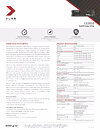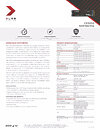Tuesday, June 8th 2021

PNY Quietly Reduces XLR8 CS3030 M.2 NVMe SSD Endurance by Almost 80%
(Update May 6: Added PNY's official word on the endurance changes)
PNY has quietly reduced the endurance rating (TBW - TeraBytes Written) for its XLR8 CS3030 M.2 NVMe SSD by almost 80%. The "quietly" comes from the fact that the company only deemed it necessary to update the product specifications on their website, and didn't announce any such changes via press release or any other means. Hence, prospective buyers who might look to launch reviews of this NVMe SSD so as to make a decision regarding its purchase may be led astray by the (then) quoted TBW ratings, which are actually no longer relevant for samples of this SSD - at the very least for any model manufactured post-specifications change on their website.
There are no other changes to specifications - neither in capacity, nor in Read/Write speeds. However, endurance has taken an almost 80% dive in the worst case scenarios - those of the 2 TB and 500 GB capacities, which saw reductions from their respective 3,115 TBW and 800 TBW down to 660 TBW and 170 TBW - or 78.8%. The 1 TB capacity takes a 78.4% dive in endurance (1665 TBW down to 360 TBW) and the 250 GB model is the least affected one, whilst still losing out 55.3% of its rated endurance (380 TBW down to 170 TBW).There are various reasons why manufacturers would change specifications on their products - such as the current semiconductor shortages, which might make them opt for components based more on their availability than actual specs. This isn't the first case, and likely won't be the last - companies such as ADATA and Kingston have also made changes to product components which changed their specifications. However, it sounds reasonable that manufacturers would at the very least issue a press release when these component changes actually impact product performance, instead of simply changing the values displayed on their product pages. Below, you can check out the product specifications - original on the left, revised on the right.
Source:
Tom's Hardware
PNY has quietly reduced the endurance rating (TBW - TeraBytes Written) for its XLR8 CS3030 M.2 NVMe SSD by almost 80%. The "quietly" comes from the fact that the company only deemed it necessary to update the product specifications on their website, and didn't announce any such changes via press release or any other means. Hence, prospective buyers who might look to launch reviews of this NVMe SSD so as to make a decision regarding its purchase may be led astray by the (then) quoted TBW ratings, which are actually no longer relevant for samples of this SSD - at the very least for any model manufactured post-specifications change on their website.
There are no other changes to specifications - neither in capacity, nor in Read/Write speeds. However, endurance has taken an almost 80% dive in the worst case scenarios - those of the 2 TB and 500 GB capacities, which saw reductions from their respective 3,115 TBW and 800 TBW down to 660 TBW and 170 TBW - or 78.8%. The 1 TB capacity takes a 78.4% dive in endurance (1665 TBW down to 360 TBW) and the 250 GB model is the least affected one, whilst still losing out 55.3% of its rated endurance (380 TBW down to 170 TBW).There are various reasons why manufacturers would change specifications on their products - such as the current semiconductor shortages, which might make them opt for components based more on their availability than actual specs. This isn't the first case, and likely won't be the last - companies such as ADATA and Kingston have also made changes to product components which changed their specifications. However, it sounds reasonable that manufacturers would at the very least issue a press release when these component changes actually impact product performance, instead of simply changing the values displayed on their product pages. Below, you can check out the product specifications - original on the left, revised on the right.
The changes PNY made to its XLR8 CS3030 SSD's warranty policy were driven by two factors, the uptick in demand for using high-speed, consumer-grade SSDs for Chia farming, and the industry-wide shortage of NAND. These changes were published and made public on the company's website in both the warranty section as well as the CS3030 product spec sheet on May 17, 2021.
Why TBW was added to PNY's CS3030 SSD warranty:
The onset of Chia farming has many PC component brands rethinking their warranties, as consumer-grade hardware is not typically under the type of intense write use that is synonymous with Chia farming. The write activity required to farm Chia coin can wear out typical consumer-grade SSDs in a matter of weeks. Because of this, PNY, like others, introduced a Terabytes Written (TBW) policy to its SSD warranty. For consumers using these SSDs as intended, the warranty time (years) period will likely run out before they hit the TBW thresholds.
Source: https://www.tomshardware.com/news/galax-kills-warranty-ssd-mining.
Why the CS3030 TBW rating was reduced:
Due to an industry-wide shortage of NAND, PNY qualified additional NAND options for the XLR8 CS3030 SSD. While the read/write performances met or exceeded published specs, some of the TBW endurance was lower thus PNY set its warranty threshold and updated the sell sheet based on the lowest TBW rating of those qualified options. For consumers using these SSDs as intended, the warranty time (years) period will likely run out before they hit the TBW thresholds.
PNY's SSD warranty coverage:
Drives sold prior to May 17, 2021, correspond to the previously posted warranty, whereas drives sold on May 17, 2021, and later correspond to the latest warranty and TBW thresholds. Again, most consumers that use these drives as intended will likely exceed the warranty time (years) period before crossing the TBW threshold.



30 Comments on PNY Quietly Reduces XLR8 CS3030 M.2 NVMe SSD Endurance by Almost 80%